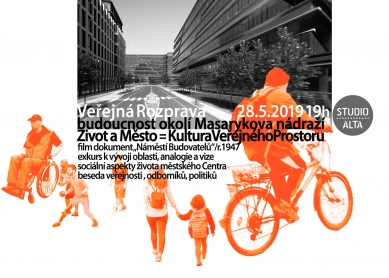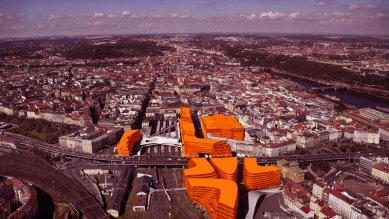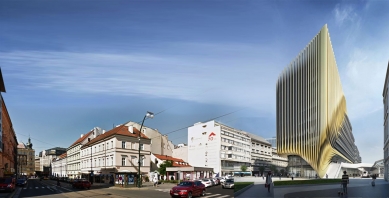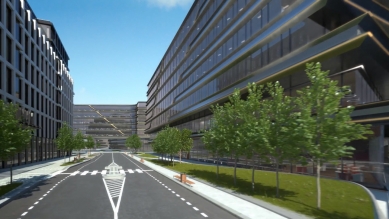
Future of the Area around Masaryk Station - Public Discussion
Florence will live! The cultivation of the city is a necessity!
Source
Mojmír Pukl, Akce za lidskou pospolitost
Mojmír Pukl, Akce za lidskou pospolitost
Publisher
Tisková zpráva
28.05.2019 10:00
Tisková zpráva
28.05.2019 10:00
Czech Republic
Prague
In January 2019, the second public discussion about the future of the area around Masaryk Train Station took place. Reflection on the culture of public space and the issues of this part of New Town.
The meeting was initiated and organized by the Action for Human Community (AzLP), hosted by the multicultural center Studio Alta, with contributions from the Pirates and NfA. The event followed up on a meeting last September at Fuchs Café on Štvanice, and the next discussion is planned for May.
In Alta, both the lay and professional public gathered. Contributions were presented by Mgr. Mojmír Pukl, Prof. Ing. arch. Karel Maier, CSc., head of the Institute of Spatial Planning at the Faculty of Architecture of the Czech Technical University, and remarks were made by Ing. arch. Tomáš Vích/Pirates/, chair of the Commission for Urban Development of Prague 1, followed by a rich and constructive discussion. Invited were, among others, the dean of FA Prof. Ing. Arch. Ladislav Lábus, Assoc. Prof. Ing. arch. Petr Hlaváček, 1st Deputy Mayor, Mgr. Ondřej Boháč, representatives of iPR and Penta, who excused themselves.
The program was started with a period film documentary "The Square of Builders" by B. Vošahlík from 1947, which outlined the development of the city, the emergence of Masaryk Train Station, and the then-existing issues of air quality and transportation. The search for new solutions was illustrated by several projects from a variety of designs, plans, and competitions arising since the late 19th century, which significantly urbanistically reorganized the area alongside the cancellation of the station. In the documentary, sculptor and architect Zdeněk Pešánek presents a generous concept of a new square with a large volume of modern buildings and greenery stretching from the current Republic Square to the foot of Vítkov.
The subsequent presentation by Mgr. Pukl highlighted the comparisons of the city's image development, as a transformation of the culture of the environment, growth, cultivation, and documented the detrimental consequences of building closures, the destructive encroachment of the north-south corridor, and the devaluation of the city center today by contemporary, downgrading, unconceptual, and exclusively commercial developments (V Celnici St., Palladium, Florentinum, International Business Center, Hotel Hilton + the upcoming "Central Business District"!). The speaker emphasized the main attributes of successful development of the city's center potential - contemporaneity, functionality, activity, creativity, uplifting culture, and an emphasis on the highest quality.
Professor Maier highlighted the importance of landmarks, cultural venues in the urban structure, and the projection of social motivations, ideas, and desires into objects at key points in the city. He pointed out that Florenc is the last place in the historic center where we have the opportunity for a social endeavor through the placement of a significant cultural institution, which could become an initiating moment for the rejuvenation of the city and a symbol of societal transformation.
Ing. arch. Tomáš Vích quoted the theory of postmodern urbanism, which warns against overburdening and densifying the center, as well as the growth of residential agglomerations in satellites. An optimal city is polycentric with small distances. Vích pointed out the alarming state of air quality in the area and the necessity for sufficient greenery as a solution.
In the following debate, attendees expressed criticism towards Penta's plan to build monofunctional commercial properties here, aimed for resale. What Penta presents in its promotional campaign for the Central Business District "Masaryčka connects" as a benefit (the line to the airport and covering platforms) should be executed by SŽDC (the state). This cooperation is only beneficial for Transaction Entities at the expense of the city and state, residents, and the future.
The question arose as to whether the problem lies with politicians or architects?
The debate concluded that we are currently in a situation where it is essential to adopt standard procedures used in developed European societies: to constitute a qualified and enforceable consensus, to implement public participation including professional, in the form of open discussions, and to assert the needs of the city in negotiations with investors,
It can be said that there was even agreement on this position, as the attendees rewarded it with applause!
The next public discussion on this issue is to take place on May 28, 2019, at the multicultural center Studio Alta. Representatives from the professional community, members of the political representation, and especially the general public and cultural public are invited (program subject to change).
The meeting was initiated and organized by the Action for Human Community (AzLP), hosted by the multicultural center Studio Alta, with contributions from the Pirates and NfA. The event followed up on a meeting last September at Fuchs Café on Štvanice, and the next discussion is planned for May.
In Alta, both the lay and professional public gathered. Contributions were presented by Mgr. Mojmír Pukl, Prof. Ing. arch. Karel Maier, CSc., head of the Institute of Spatial Planning at the Faculty of Architecture of the Czech Technical University, and remarks were made by Ing. arch. Tomáš Vích/Pirates/, chair of the Commission for Urban Development of Prague 1, followed by a rich and constructive discussion. Invited were, among others, the dean of FA Prof. Ing. Arch. Ladislav Lábus, Assoc. Prof. Ing. arch. Petr Hlaváček, 1st Deputy Mayor, Mgr. Ondřej Boháč, representatives of iPR and Penta, who excused themselves.
The program was started with a period film documentary "The Square of Builders" by B. Vošahlík from 1947, which outlined the development of the city, the emergence of Masaryk Train Station, and the then-existing issues of air quality and transportation. The search for new solutions was illustrated by several projects from a variety of designs, plans, and competitions arising since the late 19th century, which significantly urbanistically reorganized the area alongside the cancellation of the station. In the documentary, sculptor and architect Zdeněk Pešánek presents a generous concept of a new square with a large volume of modern buildings and greenery stretching from the current Republic Square to the foot of Vítkov.
The subsequent presentation by Mgr. Pukl highlighted the comparisons of the city's image development, as a transformation of the culture of the environment, growth, cultivation, and documented the detrimental consequences of building closures, the destructive encroachment of the north-south corridor, and the devaluation of the city center today by contemporary, downgrading, unconceptual, and exclusively commercial developments (V Celnici St., Palladium, Florentinum, International Business Center, Hotel Hilton + the upcoming "Central Business District"!). The speaker emphasized the main attributes of successful development of the city's center potential - contemporaneity, functionality, activity, creativity, uplifting culture, and an emphasis on the highest quality.
Professor Maier highlighted the importance of landmarks, cultural venues in the urban structure, and the projection of social motivations, ideas, and desires into objects at key points in the city. He pointed out that Florenc is the last place in the historic center where we have the opportunity for a social endeavor through the placement of a significant cultural institution, which could become an initiating moment for the rejuvenation of the city and a symbol of societal transformation.
Ing. arch. Tomáš Vích quoted the theory of postmodern urbanism, which warns against overburdening and densifying the center, as well as the growth of residential agglomerations in satellites. An optimal city is polycentric with small distances. Vích pointed out the alarming state of air quality in the area and the necessity for sufficient greenery as a solution.
In the following debate, attendees expressed criticism towards Penta's plan to build monofunctional commercial properties here, aimed for resale. What Penta presents in its promotional campaign for the Central Business District "Masaryčka connects" as a benefit (the line to the airport and covering platforms) should be executed by SŽDC (the state). This cooperation is only beneficial for Transaction Entities at the expense of the city and state, residents, and the future.
The question arose as to whether the problem lies with politicians or architects?
The debate concluded that we are currently in a situation where it is essential to adopt standard procedures used in developed European societies: to constitute a qualified and enforceable consensus, to implement public participation including professional, in the form of open discussions, and to assert the needs of the city in negotiations with investors,
It can be said that there was even agreement on this position, as the attendees rewarded it with applause!
The next public discussion on this issue is to take place on May 28, 2019, at the multicultural center Studio Alta. Representatives from the professional community, members of the political representation, and especially the general public and cultural public are invited (program subject to change).
The English translation is powered by AI tool. Switch to Czech to view the original text source.




1 comment
add comment
Subject
Author
Date
Petice Zastavte komerční projekt CENTRAL BUSINESS DISTRICT podle Zahy Hadid
Vích
31.01.20 10:16
show all comments
Related articles
1
09.10.2018 | <p>The public can get involved in the renewal of Masaryk Station</p>
0
20.06.2013 | Prague has approved a change allowing the reconstruction of Masaryk Station
2
14.03.2012 | Praha 1 does not like the changes that will enable the reconstruction of Masaryk Station
0
02.06.2010 | Prague will once again deal with the reconstruction of Masaryk Railway Station
2
07.08.2008 | The buildings instead of Masaryk Station could cost up to 24 billion CZK












